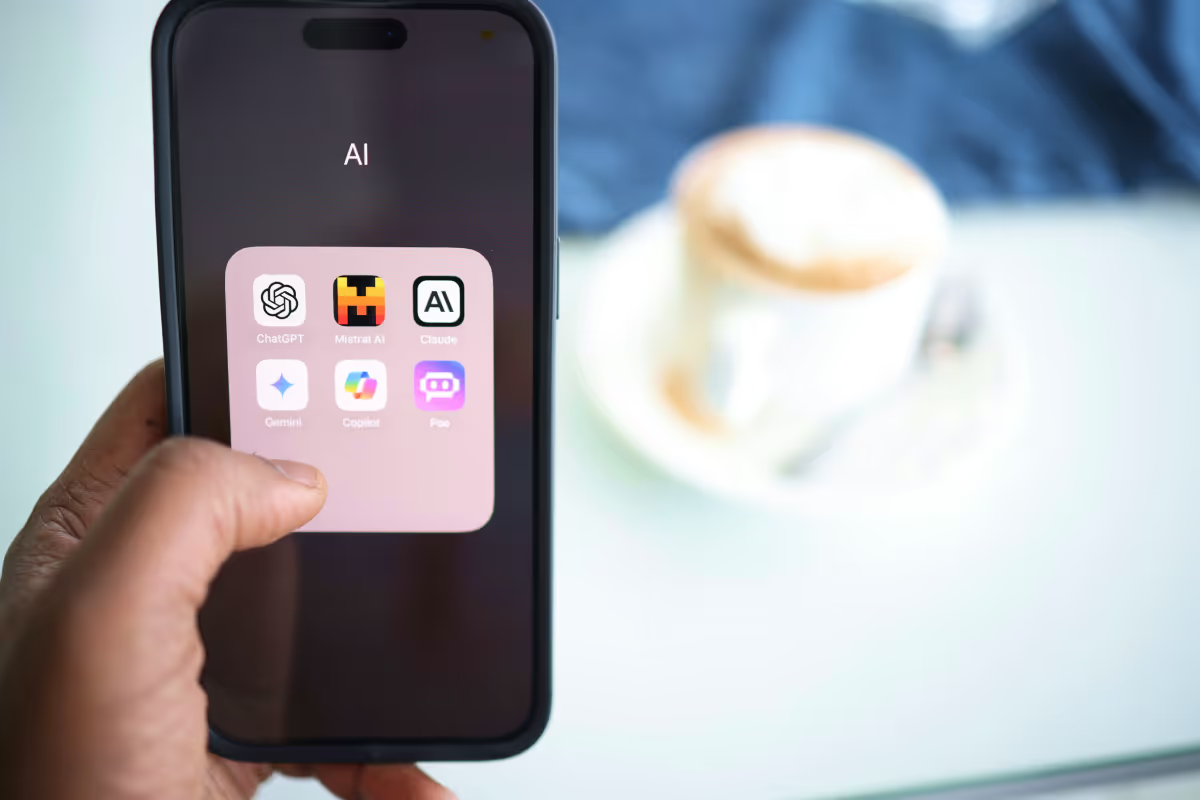Founders juggle multiple tasks while hoping to bring their products to the market fast. Few can spare time to write codes or learn how to build apps. Even if you can, your time is better spent on marketing, branding, and other activities. That’s why it’s better to leave the technical heavy lifting to an app development partner.
After all, app development requires a combination of experience, technical skills, software technologies, project management, and an understanding of user needs. The slightest mistakes in development can result in failed apps. Or users abandoning the app within days.
According to Statista, the 30-day app retention rate can be lower than 2% in certain categories. Users abandon an app for several reasons, including product mismatch, poor app experience, and lack of support. This calls for end-to-end product development services an app development partnership can provide.
I’m Stan Burenko. I’ve been leading Business Development at Uptech for years. I understand the challenges that startups encounter when seeking a reliable app development partner. That said, I’ve also helped founder turn their ideas into successful products. with our team at Uptech.
In this article, we’ll explore key considerations and criteria for finding the right app development partner for you. You will learn:
- Key considerations to avoid creating an app that has no demands;
- A step-by-step guide to landing a reliable partner who’ll ease your development worries;
- Common mistakes many founders make that jeopardize their development efforts.
Let’s begin.
Key Things To Consider Before Starting Your Search
If you search for an application development partner without prior preparation, you will likely find the wrong match. Pairing up with a developer who doesn’t align with your needs can result in cost overruns, delays, or a product-market mismatch.
So, here’s what you need to do.
Understand Your Project Needs
Clarifying your project scope is essential for a fruitful collaboration. When developing an app, it’s important to align your
- business objective;
- budget;
- technical requirements.
The founder and developer must come to a common understanding before building the app.
Define your goals
Every startup has different reasons for building an app. Some might want to build an eCommerce app to support their existing web platform, while others might want to revamp an existing app and add new features. Regardless of the purpose, list down your expectations when submitting an RFP to the potential partner.
Describe the business problem you want to solve and what roles you require from the partner. For example, you want to build a mobile app in the healthcare space. To do that, you need professional help in conducting a discovery phase and meeting HIPAA compliance. It’s also important to consider non-functional requirements, such as scalability and performance, when more users sign up for your app.
Identify your target audience
Without learning who your app serves, you can’t know what problems it should solve. Certain apps, like PayPal, target a broad audience needing an alternative payment system. On the other hand, apps like Dollar Shave Club have a narrower customer segment. The latter focuses on people in the US who need grooming products.
If you can’t define your target audience, you’ll want to partner with app development companies that can. Uptech conducts a discovery phase in projects we undertake to learn more about people who will use the app. We interview potential users and use their feedback to guide the development. This way, we ensure the apps we build have a ready market to enter.

Set the Budget for Your Project
Whether you’re bootstrapping your startup or managed to secure funding, it’s still important to allocate a budget to build the app. Otherwise, you might end up paying more than expected.
Estimate costs
Several factors affect the cost of developing an app. An app with complex features, integrations, and visuals will cost more than a simple, minimalist mobile app. Likewise, partnering with experienced developers will also cost more than inexperienced developers.
Generally, the more hours spent developing the app, the more expensive the fee is. The region or country in which your app development partner is based also contributes to the cost of app development. For example, app developers based in the US charge $100 per hour, while those operating from Ukraine charge around $50 per hour.
Allocate resources wisely
With an estimated fee in mind, you now need to decide the best way to optimize your spending. Some startups might resort to hiring an in-house team. While this seems cost-friendly in the short term, you must commit to paying salaries, perks, and office space for the long run.
For startups, financial flexibility is key to remaining agile in fast-changing markets. Therefore, some founders decide to outsource app development to a third-party agency. App development partners usually offer several collaboration models, such as time and resources, fixed price, or dedicated team. This allows startups to build apps without stretching their resources to the limit.
How to Choose the Right App Development Partner: Step-by-Step Selection Process
There is no shortage of app developers to hire. The question is, how do you find one that meets your requirements? Follow these steps, and your chances of striking the right partnership increase.
- Look for potential partners.
- Evaluate your options.
- Conduct interviews and assess communication skills.
- Finalize your decision
- Sign the contract.
Let’s explore each of them in detail.
Step 1. Look for Potential Partners
First, keep your options open and look for several app developers that fit your budget and technical requirements. If you’re wondering where to start, we share several ways below.
Leverage Search Engines and Professional Networks
The easiest way is to search “app development agencies” on Google. From the results, you might find blogs or service pages published by app development companies. There, you can learn more about their team, services, technologies, and location. If any of those companies interest you, reach out to discuss further.
Another way to find possible app development partners is to ask around amongst your circles. For example, another founder you know has engaged an app developer for their project. Getting recommendations from someone you trust reduces the risk of working with the wrong app developer. In fact, most of our new clients found us because they are referred by our existing clients.
Utilize Platforms like Clutch and Upwork
Clutch
There are also several platforms that you can explore for possible candidates. Clutch, for example, is an independent marketplace for finding business services. Not only does it list the services that app development companies provide, but it also includes rate, specialization, location, and other search criteria.
Upwork
Some founders also turn to freelancing platforms like Upwork to outsource their app development needs. While freelancers are an option, we don’t recommend fully relying on them. Freelancers might juggle several projects, and few can commit to strict timelines and provide quality deliverables.
Still, Upwork can be a good place to find app development agencies. The platform allows software development companies to trade their services like freelancers do. The only thing is that there are fewer options compared to searching on Google or marketplaces like Clutch.
Step 2: Evaluate Your Options
Chances are, you have dozens of candidates on your shortlist. To proceed, you need to narrow down your options. There are two ways to go about it.
Assess Technical Skills and Expertise
Building different apps requires different types of skill sets. For example, developing an Android app requires Kotlin, while iOS developers use Swift. Knowing the areas in which the candidates specialize lets you determine if they are suitable for your project.
Most app development projects require several skill sets that a freelance developer cannot offer. This is also a reason why partnering with a multidisciplinary app development team like Uptech is better.
Explore the tech stack we adept.
Review Portfolios and Case Studies
Don’t enter into an app development partnership until you do a background check on the selected candidates. Getting independent opinions on the candidate helps you spot potential red flags and avoid bad partnerships. Remember that we mentioned searching for partners in marketplaces like Clutch and GoodFirms. You can also use them to review their client feedback.
When you’re reviewing client feedback, also take the opportunity to explore the developer’s portfolio. Ideally, you want to partner with a developer experienced in your industry. Developers who have worked on similar projects can accelerate your development because they’re aware of common pitfalls.
For example, developing a generative AI app requires an understanding of ethical AI practices, language model biases, and data privacy. It’s better to partner with developers who have built AI applications than one who doesn’t specialize in that field.
Step 3: Conduct Interviews and Assess Communication Skills
A software development partnership is a long-term collaboration. Besides technical competencies, communication plays a significant role in ensuring successful projects. For example, if a developer can’t provide concise feedback or doesn’t speak your language fluently, you’ll want to consider other options.
So, spend time interviewing shortlisted candidates before striking up a partnership. Face-to-face interviews let you evaluate if the candidates have the soft skills required to be a reliable partner. Through interviews, you can assess their attitude, openness, and ethics.
We share tips for conducting an effective interview.
Prepare Interview Questions
Asking the right interview questions helps you better understand the candidates. You can start with warm-up questions about their previous projects, team members, tech stacks, and the city they operate in. Also, take the opportunity to learn more about the collaboration model they offer, such as dedicated teams or staff augmentation.
Then, gradually move to probing questions that let you reveal more insights. Instead of asking close-ended questions, use open ones that let the candidate voice their thoughts freely. Below are several examples.:
- How do you manage a multidisciplinary team to ensure positive project outcomes?
- Describe how you cope with last-minute project requirement changes.
- Briefly describe the software development workflow your team uses.
- How do you communicate feedback to clients in different time zones.?
- What is your approach to performing quality assurance checks?
Asking these questions gives you a better picture of how the potential app development partner operates.
Consider Responsiveness and Clarity
During the interview, pay attention to how the developer responds to your question. Observe not only the answer they provide but also body language, politeness, confidence and other abstract qualities. This is important because how they respond in the interview will likely reflect how they communicate with you when you hire them.
Step 4: Finalize Your Decision
It’s tempting to hire the most eloquent candidate from the interview. However, don’t rush the process until you’re confident of your choice. Here are two phases you must go through before officiating the partnership.
Compare Finalists and Making Your Choice
After interviewing all candidates, spend a few days evaluating all candidates. Compare their
- hard skills;
- soft skills;
- cost;
- location;
- specialization;
- and other criteria.
Sometimes, a developer might fare well in every aspect but costs more because they’re based in expensive cities. In that case, consider hiring offshore developers who charge a more affordable fee.
Negotiate Terms and Signing Agreements
Once you’ve identified the right candidate, discuss and agree on terms that benefit both parties. If necessary, consult your legal teams to clarify project scopes, intellectual property ownership, indemnification, data protection, and other aspects. Then, prepare to sign the partnership contract.
Step 5: Sign the Contract
Ensure that all documents are in order before signing the contract. In some cases, you can demand the app developer to prepare a Non-Disclosure Agreement before entering a partnership. Also, watch out for potential red flags that involve source code ownership, hidden charges, and commitment to post-release support.
Here’s how.
Read through the Contract
It’s important to protect your interests with a legally binding contract. Your app development partnership contract should stipulate all terms to be respected by both parties throughout the collaboration. This includes:
- Project scope.
- Timeline.
- Fee and payment terms.
- Intellectual property rights.
- Penalties for non-fulfillment.
Seek legal assistance if you have doubts about your contract.
Clarify Deliverables and Deadlines
Don’t be pressured into signing the contract. Go through the document in detail and ensure it lists important deliverables. For example.
- Software requirements specifications describing functional and non functional requirements of the app.
- Quality assurance reports are generated at each development stage.
- Mock-up design for early-stage user validation.
- Prototype for pre-launch testing and review.
What’s equally important is to ensure each deliverable is tied to a deadline. Otherwise, the developer is not legally obliged to follow a specific schedule when the contract starts. Once you’re satisfied with the contract, sign it to officiate the partnership.
Here’s a checklist to guide you in choosing an app development partner.
Common Mistakes to Avoid When Choosing A Mobile Development Partner
Establishing mobile app partnerships with software development companies is not straightforward. Founders might unknowingly make mistakes that complicate subsequent collaborations. These are some common ones.
Overlook the Importance of Culture Fit
You can find potential app development partners in many regions, but not all are a good fit culturally. Let’s say you’re an American startup, and you’re comfortable working with developers sharing similar work ethics. If you hire a developer from China, India, or Indonesia, you’ll have problems working together.
Cultural and language barriers are major obstacles to successful collaboration. If your developer needs to translate every conversion and vice versa, you’ll have a tough time communicating your ideas. Likewise, having different work expectations because of different cultural backgrounds can make partnership fails.
Make Decisions Based Solely on Cost
Understandably, founders want cost-friendly options when choosing an app partner. However, the cheapest developer almost never offers quality work. Ultimately, you end up paying much more than the amount you hope to save.
Let’s say you hire a freelance developer for $8 per hour on Upwork. The low hourly rate is attractive, but there’s no guarantee of the results. If the developer fails to deliver, you’ll have to hire another developer, possibly at a higher price, to redo the work.
Ignore Post-Launch Support and Maintenance
When your app is released to the public, you need a support team to resolve bugs and respond to other issues. Some startups have found that their partnerships don’t cover post-launch support until it's too late. Without a support team on standby, founders are putting user satisfaction, revenue growth, and brand reputation at risk.
So, ensure that your app development partner is committed to supporting the app post-release. Besides fixing bugs, they should be your go-to partner for implementing new features, improving app performance, and enabling scalability as your startup grows.

Why Choose Uptech as Your App Development Partner
Uptech is an international app design and development company founded in 2016. Our mission is simple: We want to build solutions that positively impact our clients and their customers. That means going beyond writing codes to understanding and solving users' problems.
To do that, we need coordinated efforts amongst our team of project managers, software engineers, designers, and quality assurance engineers. They work closely with our clients to ensure users love the apps we built. Over the years, we have served more than 150+ startups worldwide, including brands like Dollar Shave Club, GOAT, and Aspiration.
In any project we do, our team believes in honesty, dedication, and transparency when collaborating with founders. Rather than operating as a vendor, we strive to be a tech partner that startups can trust. Our effort earned bagged us several awards, including
- Top B2B Companies in 2020-2022 by Clutch
- Top App Developer by Good Firms.
- Mobile Excellence Award & Honorable Mention by awwwards
We’re selective in the industry we venture into, and our focus lies in these.
Fintech
We build mobile banking, insurtech, investment, and other financial-related apps that allow user-friendly, safe, and fast transactions. Our team prioritizes data security and compliance with regulatory acts like GLBA, PCI-DSS, and GPDR. Learn more about our financial app development services.
Healthcare
We help healthcare startups compete in an evolving industry with mHealth, telehealth, hospital management systems, and more. Successful healthcare apps require strict compliance with HIPAA, GPDR, and other data privacy acts. Learn why healthcare startups choose to partner with Uptech here.
Generative AI
Generative AI is still an evolving technology. Whether integrating AI features or building an AI app from scratch, you need experts who know the advantages and limitations of specific AI models. Learn how Uptech helps our clients build functional, secure, and responsible AI solutions here.
Conclusion
You need an app development partner if you want to increase the chances of a successful app release. Taking on development robs valuable time and resources from your startup. Rather, it’s better to partner with a software development company that you can trust.
We’ve shown how to search, shortlist, and interview a potential app development partner in this article. You’ve also learned mistakes to avoid when looking for one. Remember, the cheapest option is seldom the best one.
If you need help finding a suitable app partner, reach out to our team. With experience working with 150+ startups worldwide, we know we can help you find yours.
Leave us a message and we'll be happy to become your app development partner.
FAQs
How do app partnerships work?
In an app partnership, an external software team designs, develops, tests, and releases your app. You enter into a binding agreement with the software partner that specifies the scope, payment, deliverables, and other terms of the collaboration.
How do I find a partner for app development?
You can find an app development partner through search engines, business marketplaces like Clutch, freelancing platforms, or your professional network.
How do I know if an app development partner is right for my business?
First, ensure that the rate the potential partner charges fits within your budget. Partners should also understand your business needs and have positive reviews from past clients. It’s also important for the partner to share a similar culture and language. That’s why we recommend interviewing shortlisted candidates before making a decision.
Is it better to choose a local app development partner or is outsourcing a viable option?
If you’re a startup in bootstrap mode or conscious about cash flow, outsourcing to a more affordable region is better. Instead of paying a premium price, you can collaborate with talented app developers at a lower rate.
What should I include in my Request for Proposal (RFP) when seeking an app development partner?
Your RFP should include criteria such as
- Your company description.
- Project overview.
- Scope of work.
- Deliverables.
- Technical requirements.
- Preferred communication methods.
Learn more about writing a comprehensive RFP in this article.




































































































